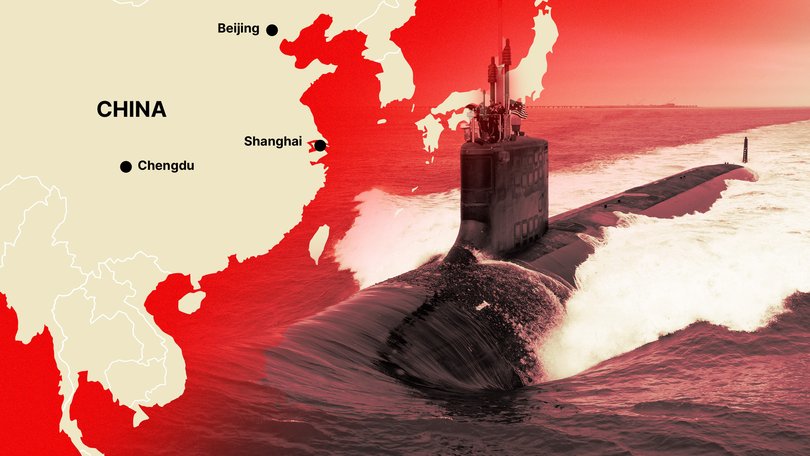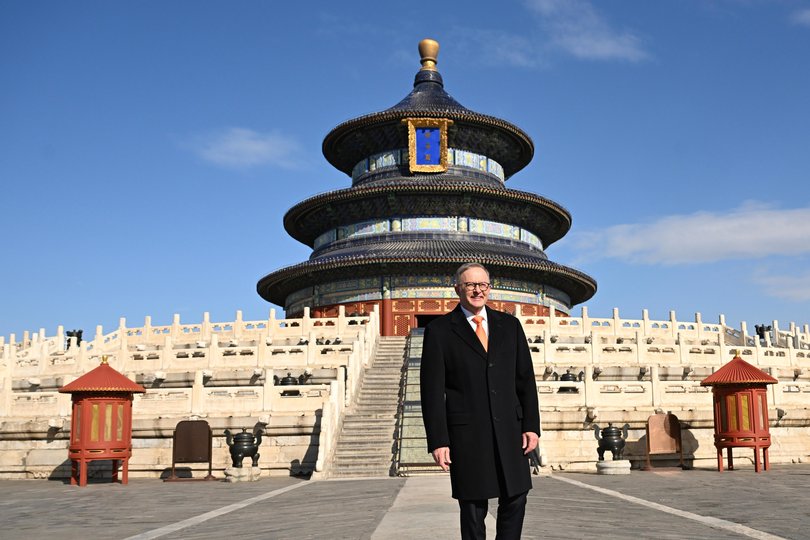Anthony Albanese China trip: Barrage of warnings for Beijing-bound PM
Anthony Albanese is spruiking his six-day visit to China as important for national security and the economy as concerns grow over his lack of direct engagement with the US on defence and trade.

Anthony Albanese is spruiking his six-day visit to China as important for national security and the economy as concerns grow over his lack of direct engagement with the US on defence and trade.
The three-city tour — Beijing, Shanghai and Chengdu — has been cast as part of a wider reset on trade ties with China but comes as the Prime Minister is under mounting domestic pressure over his failure to first meet the US President to personally argue the case for a tariff carve-out and to Donald Trump’s public commitment to the $368 billion trilateral AUKUS defence deal.
Mr Albanese, who starts his trip on Saturday, touted the upcoming direct talks with Chinese leaders, which will include Premier Li Qiang and President Xi Jinping, as important for national security and Australia’s economy.
Sign up to The Nightly's newsletters.
Get the first look at the digital newspaper, curated daily stories and breaking headlines delivered to your inbox.
By continuing you agree to our Terms and Privacy Policy.“The relationship with China means jobs in Australia. It’s as simple as that, jobs in iron ore, the resources sector, jobs in the wine export sector, jobs in areas like barley and red meat as well, that have been major exports to China,” he said.
“We look forward to a further expansion of that trade in new industries.”
China, Australia’s largest trade partner, has indicated it wants to seize the moment to bolster economic cooperation, specifically in emerging artificial intelligence technologies and direct investment opportunities.
Mr Albanese will be joined on his China trip — his second visit as Prime Minister — by a Business Council of Australia delegation of corporate leaders from the banking, mining and metals industries and higher education.
Canberra continues to rebalance its relationship with Beijing after a series of Chinese import bans on Australian commodities took a heavy economic toll on agriculture and resources, particularly in the wine, seafood and coal sectors.

Mr Albanese said he was looking forward to travelling with so many Australian businesses and university representatives as a “further demonstration of the good relations that exist between Australia and China, something that both countries have worked on”.
Among the executives joining the Prime Minister are Fortescue’s Andrew Forrest, BHP’s Geraldine Slattery, HSBC chief Antony Shaw, Rio Tinto’s Kellie Parker and the vice-chancellors of Monash and UNSW universities Profs Sharon Pickering and Attila Brungs.
David Olsson, president of the Australian China Business Council, and who is one of the senior corporate leaders invited to a roundtable discussion with Chinese counterparts in Beijing, said the meeting was an opportunity to enter a more strategic phase of the relationship to build long-term trust.
“The delegation reflects renewed confidence in the relationship, but also a shared recognition that we need to think differently,” he said.
“This means modernising our frameworks for trade and investment, investing in new areas of capability, and working more closely with Chinese counterparts to solve shared challenges.”
The Prime Minister leaves Australia amid a barrage of calls to tackle difficult conversations with the Chinese leadership about its growing military build-up in the region.
He has been told he must perform a tight balancing act between advancing Australia’s blossoming trade ties with China and conveying global concerns about Beijing’s unprecedented defence spending and territorial ambitions in the South China Sea and towards democratic Taiwan.
The Chinese Communist Party claims Taiwan, which functions like any other nation with its own democratically-elected government, foreign policy and currency, and has threatened to take the island of 23.5 million by force.
Writing in The Australian on Friday, Taiwan’s envoy to Australia Douglas Hsu urged Mr Albanese to take a cautious approach to his interactions with Chinese leaders.
“While dialogue and mutually beneficial co-operation are important, Australians know successful engagement requires an understanding that China’s political system prioritises state power over all else,” he said.
President Xi’s 13-year-rule had produced a “dramatic transformation in China’s strategic posture and military ambitions,” Mr Hsu wrote, pointing to China’s militarisation of the South China Sea in defiance of international law, the weaponisation of trade and aggression in the Taiwan Strait.
Foreign Minister Penny Wong flagged Australia’s own alarm about China’s surging military advancement in a speech at the Institute for Strategic and International Studies in Malaysia on Thursday.
Senator Wong said the United States’ presence in the region “remains critical to the Indo-Pacific’s strategic stability” against “the worrying pace of China’s nuclear and conventional military buildup,” which she said was proceeding “without the transparency that the region expects”.
The Foreign Minister urged China to wield its strength to contribute to security and economic resilience.
“China’s size and weight makes it central to solving global challenges, from climate change to global public health, from international trade to the energy transition,” she said.
The Human Rights Watch has also called on the Prime Minister to not “gloss over” human rights concerns in China as simply a difference in views.
“Albanese should reinforce messages about abuses in Hong Kong, Xinjiang, and Tibet and urge the Chinese government to end its campaign of harassing and intimidating dissidents and diaspora abroad, including in Australia,” it said.
Mr Albanese on Friday indicated his trip would not simply be a charm offensive.
“We cooperate where we can, we disagree where we must, and we’re able to have those honest conversations about some of the disagreements that are there,” he said.
“Australia and China have different political systems. We have therefore different values that are reflected in those political systems. But we’ve got to be able to have that engagement directly, and that’s what we’ll be doing.”

